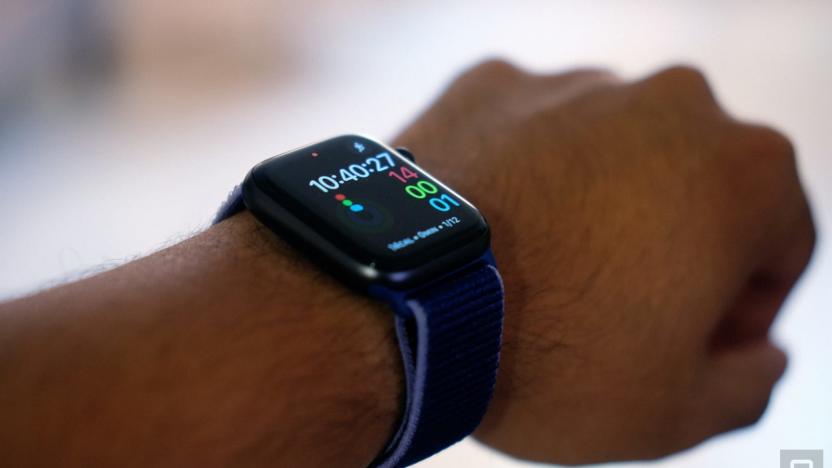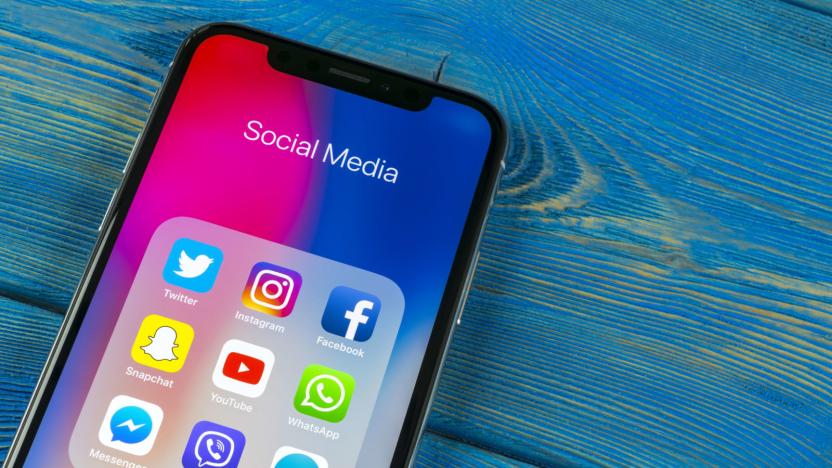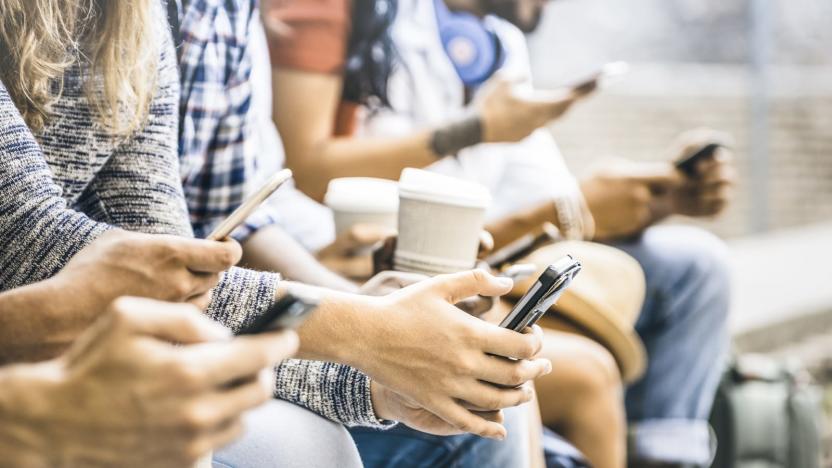pew
Latest

One in five Americans wears a smartwatch or fitness tracker, Pew claims
If you've noticed devices on many people's wrists, you're not the only one -- new data suggests they're quite common. Pew Research Center has published a study indicating that just over one in five American adult respondents (21 percent) regularly uses a smartwatch or fitness tracker. It won't surprise you to hear that adoption is significantly higher among households with incomes of $75,000 or more (31 percent), but the gaps in areas like age, gender and ethnicity were smaller.

Study: Americans believe social networks make the news worse
You're not alone if you think social networks are degrading the quality of news. A Pew study indicates that 62 percent of American adults believe social media companies have "too much control" over news, and 55 percent believe these companies have created a "worse mix" of news through their feed algorithms and other editorial choices. Not surprisingly, the survey respondents pinned it on the quality of the news that surfaced in their social streams.

Most Americans believe algorithms will always be biased
If you're convinced that many algorithms are biased, you're not the only one. Pew has conducted a survey indicating that 58 percent of American adults believe algorithms and other programming will always contain some kind of human bias. That figure is partly skewed by age (63 percent of those over 50 didn't believe algorithms could be completely neutral), but even the relatively optimistic 18-29 crowd showed some distrust, with 48 percent believing there would still be some bias.

Cellphone and internet adoption may have peaked in the US
There's no question that technologies like cellphones and internet access have become ubiquitous, but they now appear to be hitting their peak in the US. Pew Research Center's latest technology study has shown that key categories technological adoption has gone virtually unchanged since the last study in 2016, suggesting they've hit saturation points. Much like two years ago, about 95 percent of all Americans studied (99 percent in the ages 18-49 group) have cellphones, 89 percent have internet access, 77 percent have smartphones and 69 percent use social networks. In fact, PC adoption went down -- 73 percent have a computer where 78 percent did in 2016.

Americans aren't ready for biotech-enhanced superhumans
Superhero movies might be in, but the American public isn't quite keen on seeing a real Captain America. Pew Center researchers asked people how they'd feel about genetically modifying babies to reduce the risk of serious illnesses. They also asked participants for their thoughts on implanting brain chips and transfusing synthetic blood into perfectly healthy humans to make them faster and stronger, as well as to improve their capacity to process information. The participants' answer? Well, let's just say they're wary of using advancements in biotechnology to enhance humans' capabilities.

Americans think it's rude to stay glued to your phone, do it anyway
You're no doubt astute enough to know that you should stop using your cellphone in some social situations, but how good are you at heeding your own advice? If Pew's latest study is any indication, the answer is "not very." The research center found that 82 percent of American survey respondents see cellphone use as a bane to social interaction, but that 89 percent of phone owners used their devices during their most recent gatherings. And they weren't just checking for notifications, either -- more than half of those surveyed were messaging, taking photos and answering calls.

Pew: if you use Facebook or Twitter, you probably get news there
Do you read news on Facebook instead of a dedicated site, or catch breaking stories on Twitter instead of TV? You're not alone. Pew's latest study shows that 63 percent of American Facebook and Twitter users rely on the social networks as news sources -- at least an 11 percent jump from two years ago. That isn't entirely surprising given recent (and ongoing) efforts to highlight the day's events on both services, but it also shows how some news is virtually defined by what happens on social networks. If you followed protests against police abuses, for instance, the best sources were usually Twitter-savvy marchers.

Pew: 7 percent of Americans only use their phone for internet access
You probably lean heavily on your smartphone for internet access these days, but for some Americans it's not a nice-to-have convenience... it's their only way of getting online. Pew Research Center's latest survey estimates that 7 percent of Americans depend solely on their phone for internet service, and have no practical alternatives. About 10 percent have a smartphone but no home broadband, and 15 percent have just a limited number of options beyond their handsets.

A third of Americans improved their privacy in light of spying leaks
When you found out about the scope of the US government's mass surveillance efforts, did you improve your online privacy habits? If so, you're in good company. A Pew Research Center survey indicates that about 30 percent of Americans have taken at least one step to protect their info from prying eyes, whether they've toughened up their social network settings or held more conversations in person. About 22 percent say they've changed the way they use technology like email and cellphones.

Pew survey: 21 percent of US cellphone owners get online mostly through their phones
There have been signs that Americans are leaning more and more on the smartphone as a primary internet device, and nowhere is that clearer than the latest edition of Pew's Cell Internet Use survey. The research group found that 21 percent of American cellphone owners now get online chiefly through their handset, up from 17 percent last year. Offline users, meanwhile, have been reduced to a minority -- 63 percent of US cell owners have hopped on the internet from their phones at some point. The PC isn't going away anytime soon, but it's clear that the traditional computer is just one internet client among many.

AT&T launches VoteHub, brings the presidential election to your pocket
Need yet another constant stream of election information? AT&T's joined up with the Pew Center to bring election coverage to your pocket, courtesy of VoteHub. The new app is a "nonpartisan clearinghouse for essential voter information," including candidate info, AP press coverage, election results and the requisite social sharing through sites like Twitter, Facebook and Google+. The app's available now for Android, with an iOS version coming in the near future.

Pew Research finds 22 percent of adults in US own tablets, low-cost Android on the rise
It shouldn't come as much of a surprise that more Americans than ever now own tablets, but if you'd ever wanted some quantifiable data to go along with that homespun wisdom, then the Pew Research Center is glad to help. According to its latest report, 22 percent of US adults now own a tablet of some form. While the iPad remains the dominant player in the space with a 52 percent market share, this figure starkly contrasts the 81 percent share that Pew reported in 2011. As you might expect, Android tablets have made significant inroads and now account for 48 percent of the overall tablet space. Leading the Android charge is the Kindle Fire, which alone accounts for 21 percent of all tablets sold. It's worth pointing out that Pew's survey was conducted before the release of either the Nexus 7 or the Kindle Fire HD, which means that even the most recent information is a bit behind the curve. You'll find a press release after the break that provides a much broader take on Pew's latest findings in the mobile space, but those who want to go straight to the meat should hit up the source link below.

Dropped calls, slow download speeds rank among top gripes of mobile users
Everyone has an opinion, and if they all stink, then Pew must have one hell of a tolerance for foul odors. The research group recently surveyed a number of mobile phone owners to determine their primary complaints, and while it's not much of a surprise, slow network performance stole the show. In all, 77 percent aired at least some dissatisfaction with download speeds, and nearly half of all respondents cited frequent frustration. The story is similar for dropped calls, as 72 percent of those surveyed claim to experience the annoyance at least occasionally. While less widespread, the distribution of those who receive unwanted marketing attempts via either telephone calls or text messages is roughly equal -- it seems reasonable to assume that many respondents are harassed by both means. For more surveys*, just text #eng-123 to 9999. *Outrageous fees will apply.

Pew survey finds that 17 percent of US cellphone users go online mostly on their phones
It should hardly come as a surprise that folks are spending more and more of their time online on their cellphones, but a new Pew study released today has shed a bit more light on just how common that's becoming. According to the research group, 17 percent of all cellphone users (including those without smartphones) go online "mostly" on their cellphone, while 33 percent primarily use another device, and five percent use both equally -- a hefty 45 percent still don't use their phones to go online at all, though. Not surprisingly, those numbers go up when broken down by those who do at least use the internet occasionally on their phone -- 31 percent of whom go online primarily on their phone -- and there's an even bigger jump when looking at younger users. Among those 18 to 29 who use the internet on their phones, fully 45 percent use their cellphone for most of their online activities. You can find the full report at the source link below.

Shocker: People who read e-books read more
Are you ready for a bombshell? Turns out people who read e-books read more books than those don't. That tidbit comes from the number crunchers at Pew. According to a new report titled "The Rise of E-Reading," the e-book readers read an average of 24 books in the past year, versus the 15 books read by those who didn't. Also, not particularly surprising is the fact that the percent of folks reading e-books is on the rise as well -- the number who claimed to have read an e-book in the year prior made a bit of a jump from 17-percent in December to 21-percent in February. Naturally, the whole printed thing is still a bit more widespread, with 72-percent claiming to have read a paper-type book in the year prior, when surveyed back in December.

Smartphones spread out: Pew says 46 percent of US adults now own one
Our master plan is slowly working, and soon every man and woman in our great nation will own a smartphone. Pew Research Center reports that just under half of adult Americans, or 46 percent, own smartphones currently, meaning that smartphone owners now outnumber their feature phone counterparts by five percent. Pew polled multiple demographics to get its numbers, and there was growth across the board over the last nine months. Of particular interest is the rise in ownership in the study's lowest income demographic -- under $30,000 a year -- which spiked 12 percent to 34 percent. Additionally, it showed that Android and Apple are neck and neck, with 20 and 19 percent market share of mobile owners, respectively, and Blackberry ownership declined from ten percent to six percent. The largest growth came from the 18-24 age group, up 18 to 67 percent. (Who do you think is doing all that checking in on Foursquare?). Of course, you know what they say about statistics, so head on down to the source for a full accounting and form your own opinion of what they mean.

Pew: Tablet, e-reader ownership nearly doubled over the holiday season
The number crunchers over at the Pew Research Center have released another batch of market statistics today, this time, with a focus on tablets. According to the Center's latest survey, 19 percent of all adult Americans now own some form of tablet, marking a nearly twofold increase over figures from a poll conducted in mid-December. E-reader ownership, meanwhile, increased by exactly the same margin over this period, jumping from 10 percent to 19 percent. These numbers also signal a healthy acceleration from the middle of this year, when the slate and reader markets apparently stagnated, ahead of the holiday shopping rush. Overall, about 29 percent of US adults own either a tablet or an e-reader, up from 18 percent last month. You can find more stats and breakdowns at the source link below.

Pew: Half of US customers use phones to get info in realtime
Have you ever been out and about with your cell phone, needed some information, and looked it up right there on the spot? You're not alone: The Pew Internet Research Project has released a report that says more than half of US cell phone owners have used their devices to get information they needed in real-time, right where they happen to be. That's a huge change in the way we used to deal with information -- remember when you had to print out maps or call ahead before you went somewhere, or just forget what the name of that '80s movie actually was? Nowadays, connected phones are so ubiquitous that all of that information is literally and conveniently a touch away. In fact, I'm surprised that number isn't higher. And looking up information isn't the only thing smartphone owners do with their phones: 92 percent text and take pictures, 80 percent send photos to others, and 76 percent send emails. Social networking in general is popular as well, with 59 percent of owners using those sites, and 15 percent going to Twitter specifically. We've heard before that people are actively doing these kinds of things with their smartphones, but the trend is definitely continuing.

Pew: Smartphone owners increasingly ignoring other devices to get online
Some more fun phone facts from the folks at Pew: 83 percent of American adults own a cellphone, 35 percent have a smartphone, and 87 of percent smartphone owners use their handset to browse the internet and read email, apparently having decided that the things are good for more than just making phone calls and keeping papers from blowing away. Also of interest is the fact that 28 percent of the 2,277 people surveyed actually use their small screen devices as their primary method for accessing the internet. It's worth noting that it's not a huge sample size we're working with here, so maybe hold off on declaring the PC dead -- still, it may be a sign of lots of squinting to come.

Panasonic's Sanyo and PEW buyout official: subsidiaries for life
Congratulations, Panasonic, you're now the adoptive father of two companies, Sanyo and Panasonic Electric Works. We know, the plan's been all but confirmed since July, but it's nice to see the deal go through and all the necessary paperwork signed. Both now-wholly-owned subsidiaries (through a share exchange that commenced today) are scheduled to be de-listed from the Tokyo Stock Exchange on March 29th, 2011, and after that... well, independence was fun while it lasted, eh chaps?






